Key takeaways:
- Hospital ministry emphasizes the power of presence and listening, providing emotional support to patients and families during difficult times.
- The role of a hospital chaplain includes mediating spiritual needs alongside medical care, fostering compassion and understanding within healthcare settings.
- Spiritual care is essential for addressing emotional distress, enhancing patient healing, and creating a sense of belonging, proving that holistic care encompasses both physical and spiritual well-being.
- Acts of kindness and gratitude can significantly uplift the spirits of patients, families, and healthcare staff, highlighting the importance of community in a hospital environment.
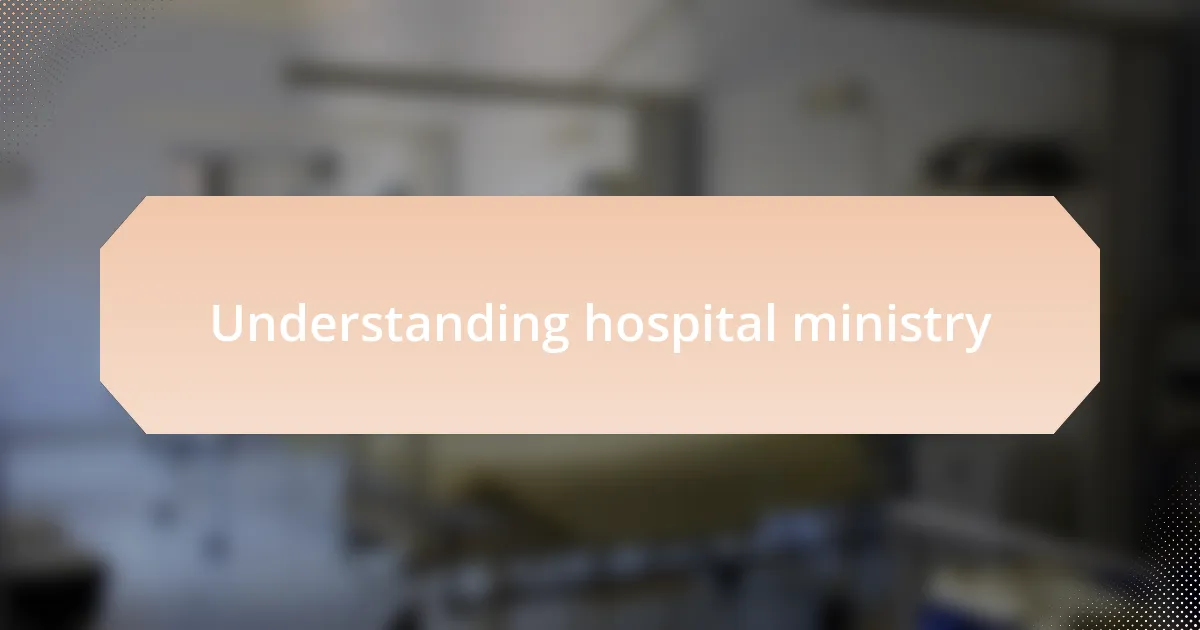
Understanding hospital ministry
Hospital ministry is a unique blend of compassion and spirituality, where chaplains serve as vital support for patients, families, and staff. I remember my first experience stepping into a hospital room; the mix of hope and despair was palpable, and I quickly realized that presence alone can be a powerful form of ministry. How can one truly understand the weight of a patient’s fears unless they have sat quietly beside them?
In my encounters, I have witnessed moments of profound vulnerability. One poignant memory stands out—a mother in tears, anxious about her child’s surgery. I offered a listening ear, and in that delicate exchange, a sense of calm washed over us both. It made me reflect on the importance of being present during life’s most challenging times. Isn’t it remarkable how a simple conversation can bring a glimmer of peace in the midst of chaos?
Moreover, hospital ministry transcends mere spiritual guidance; it fosters community among diverse individuals facing health crises. I often engage with medical staff who share their struggles, reminding me that caregivers also need care. How can we cultivate a healing environment if we overlook the spiritual needs of those who care for the ill? The interconnectedness of faith and healthcare is a tapestry woven with threads of empathy, support, and understanding.
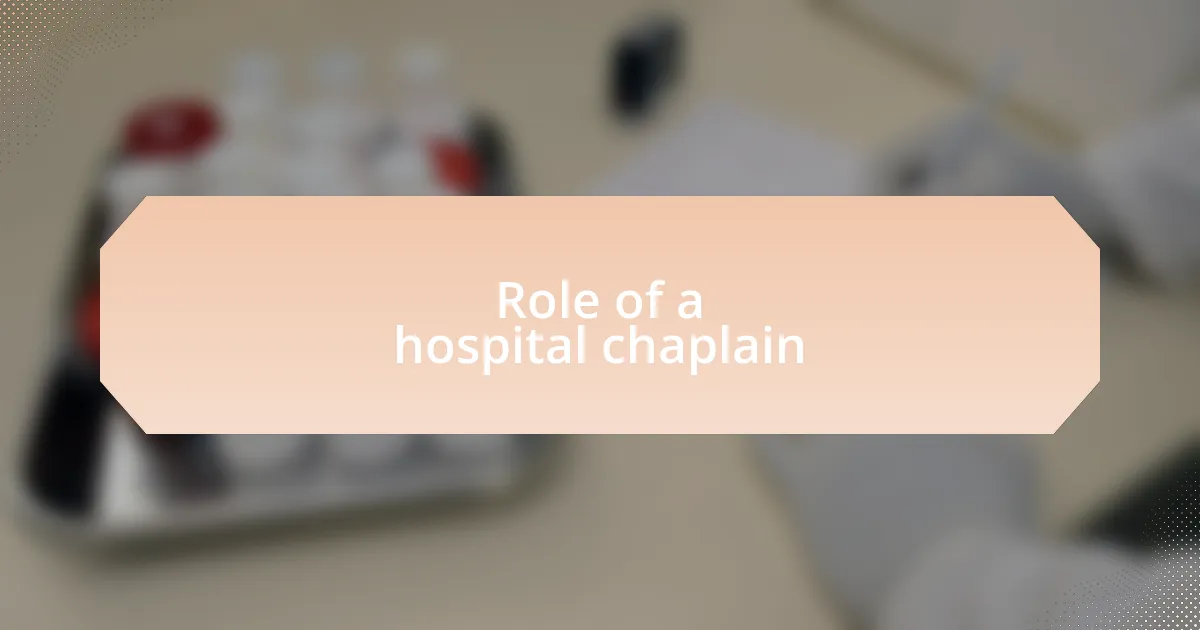
Role of a hospital chaplain
The role of a hospital chaplain is multifaceted, extending far beyond traditional religious duties. I’ve often found myself mediating between patients’ spiritual needs and their medical realities. For instance, during one visit, I encountered a patient grappling with existential questions about life following a dire diagnosis. My role was to create a safe space where they could voice their fears and hopes without judgment.
In another situation, I remember facilitating a prayer session for a family facing the loss of their loved one. The shared tears and heartfelt expressions reminded me that, at that moment, I was not just a chaplain but a fellow human being engaging in their pain. This deep connection underscores the chaplain’s duty to foster an atmosphere of compassion and understanding within the walls of the hospital.
Moreover, hospital chaplains also collaborate with the medical team to ensure holistic care for patients. I sometimes sit in on rounds with doctors and nurses, bridging the gap between clinical perspectives and spiritual care. When medical staff discuss treatment plans, I often think about how these decisions affect the emotional and spiritual lives of the patients. How can we truly care for someone if we overlook their soul’s wellbeing? This collaborative approach enriches the healing process and highlights the essential role of spiritual well-being in comprehensive healthcare.
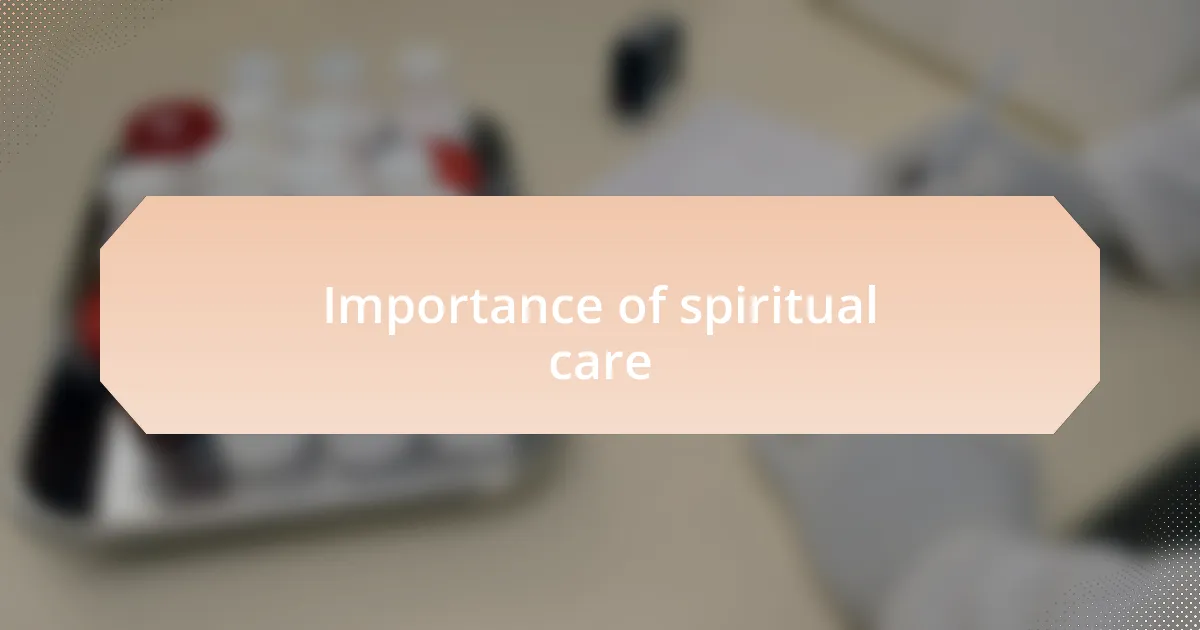
Importance of spiritual care
Spiritual care is vital in a hospital setting because it addresses the profound emotional and existential distress that often accompanies illness. I recall an instance where a patient expressed deep fear about dying alone. By simply being present and listening, I helped them articulate their fears, which allowed them to feel empowered in a situation that often seems to overshadow one’s autonomy. Isn’t it amazing how a little understanding can bring comfort amidst chaos?
Moreover, I’ve seen firsthand how spiritual care can enhance a patient’s overall healing journey. In one memorable interaction, I sat with a man who was anxious about his upcoming surgery. After sharing a moment of reflection and prayer, his demeanor shifted, revealing a newfound sense of peace. This connection highlights that addressing the spirit is not an extra service but an essential component of comprehensive healthcare. How can we ignore the essence of who someone is when they are at their most vulnerable?
In my experience, spiritual care fosters hope, resilience, and a sense of belonging, transforming the hospital environment into a space for healing. When patients and families feel their spiritual needs are recognized, I’ve often observed a significant impact on their coping abilities. It reinforces the idea that healthcare is not just about fixing the body; it’s about nurturing the heart and soul, ultimately guiding individuals towards a more profound sense of wholeness on their healing journey.
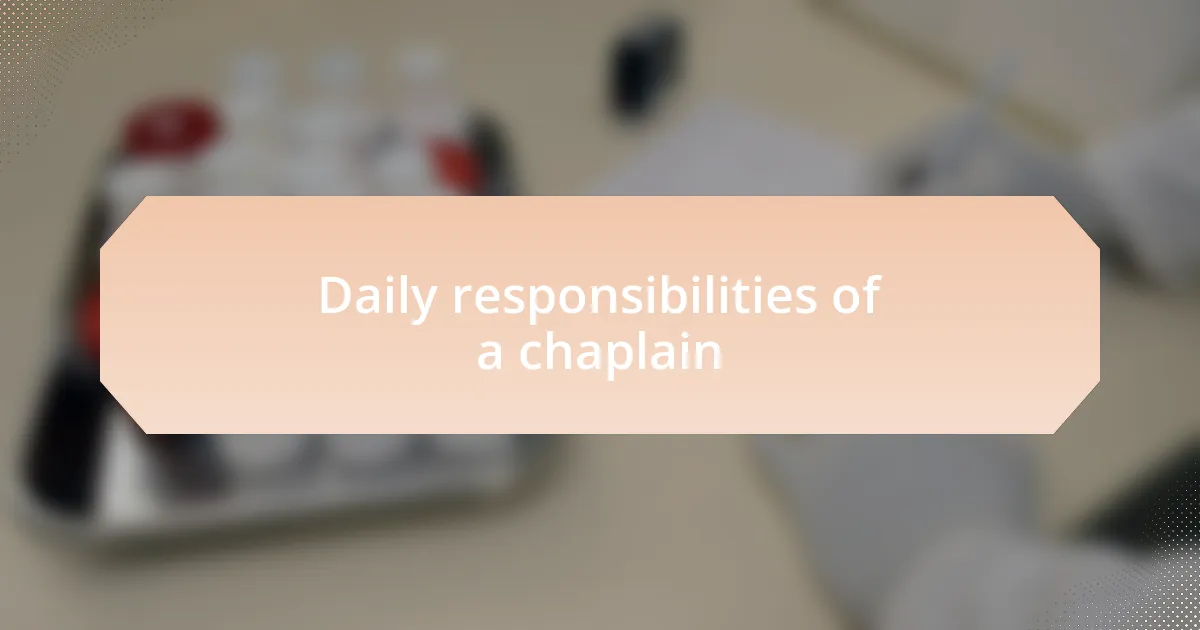
Daily responsibilities of a chaplain
The daily responsibilities of a chaplain often begin with morning rounds, where I check in on patients who may be struggling with various emotional or spiritual challenges. It’s not uncommon for me to find someone who feels isolated or overwhelmed by their situation. I remember one morning visiting a woman who had just received troubling news about her diagnosis; sitting with her and sharing a cup of tea seemed to lighten her burden, even if just for a moment. How powerful is it to witness a simple act of kindness making a significant difference?
Throughout the day, I also facilitate prayer and reflection sessions for patients and families. There are instances when a family is grappling with difficult decisions about a loved one’s care, and providing a sacred space for them to voice their fears or hopes is crucial. I once encouraged a family to take a moment for a group prayer before making a decision about a surgical intervention, which not only offered comfort but also helped them feel united in their journey. Isn’t it fascinating how collective spiritual moments can strengthen familial bonds during times of crisis?
Another key responsibility I embrace is collaborating with healthcare staff to ensure a holistic approach to care. This collaboration involves attending interdisciplinary meetings and providing insights on the spiritual dimensions of patient care. I’ve often found that sharing a spiritual perspective can open new pathways for communication among the team members. It truly underscores that a chaplain isn’t just present for the patients but also serves as a resource for the entire healthcare system, reminding us all of the profound impact that spiritual wellness can have on comprehensive treatment.
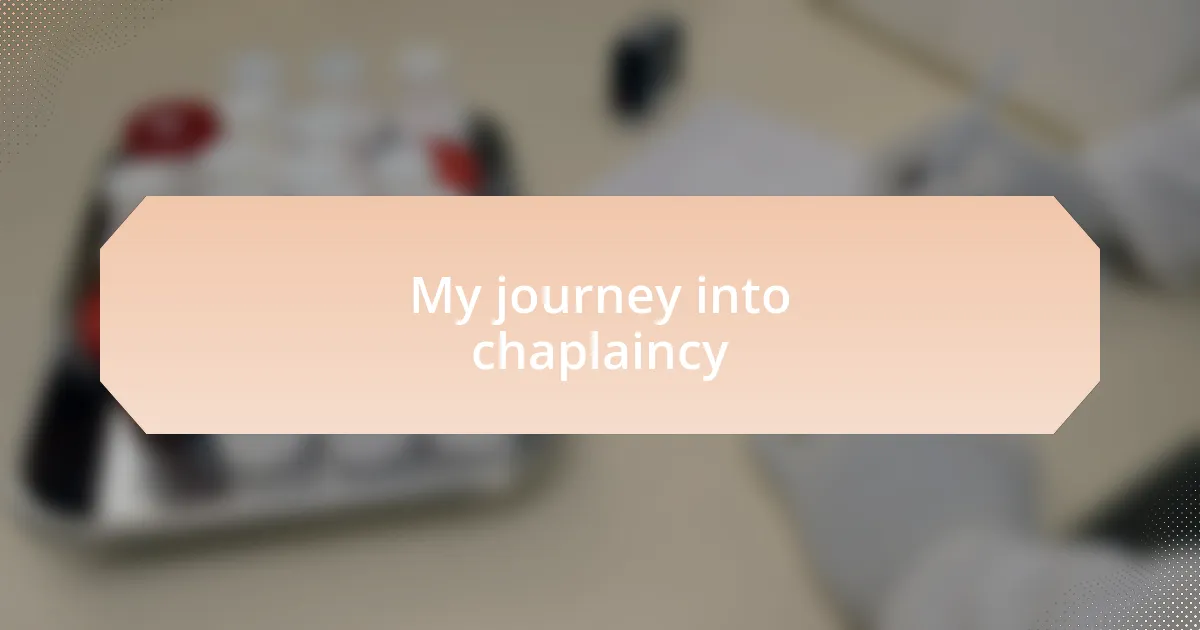
My journey into chaplaincy
While my journey into chaplaincy began with a simple desire to help others, it quickly evolved into something far more profound. I can still recall my first visit to a patient who was unexpectedly touched when I sat quietly beside them, allowing space for their grief to surface. Wasn’t it amazing to realize how often all someone needs is a listening ear and a warm presence?
As I progressed in my chaplaincy training, I encountered numerous challenges that tested my own beliefs and resilience. One day, I conducted a memorial service for a patient who had passed away alone; the room was filled with emotion as stories unfolded about his life. It struck me: how vital it is to honor every life and facilitate those moments of remembrance. How could I not feel deeply connected to this mission of compassion and empathy?
Through these experiences, I’ve learned that chaplaincy isn’t just about providing comfort; it’s about forming genuine relationships with patients, families, and even healthcare staff. I remember a heartwarming conversation with a nurse who shared her own struggles, and in that moment, we realized we were both there to support a common purpose. Isn’t that the essence of this vocation? A shared journey that brings us all closer together, even amidst the pain.
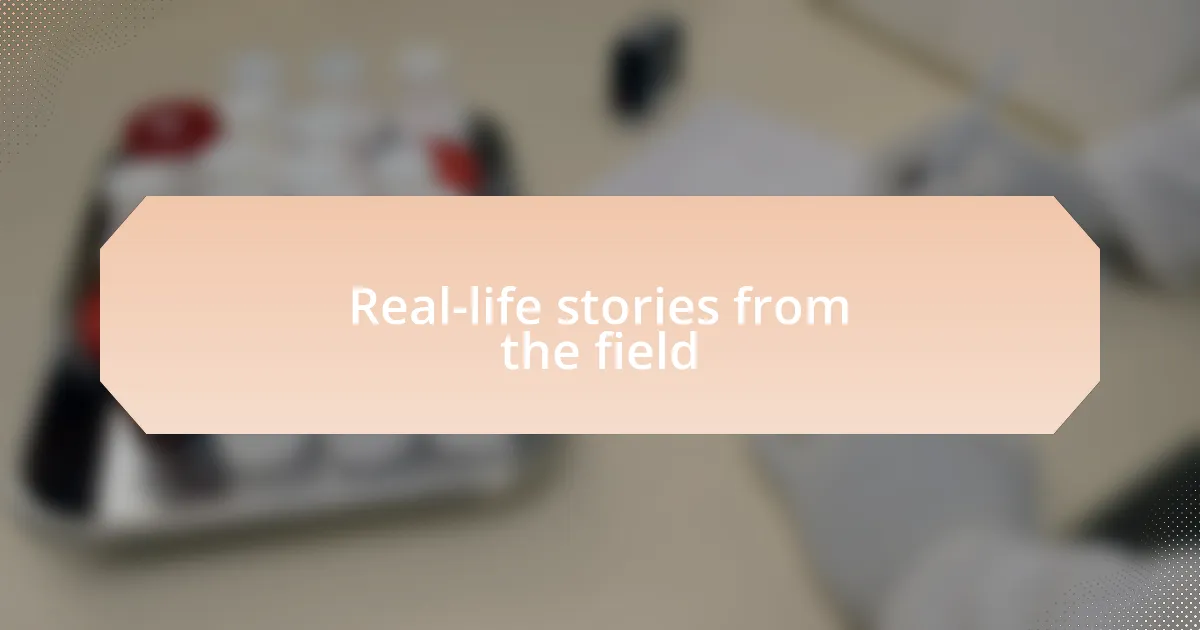
Real-life stories from the field
As I walked into a patient’s room, I noticed a framed photo of a young girl on the bedside table. The elderly man, visibly frail, shared that she was his granddaughter, and his eyes sparkled with love as he spoke about their cherished moments. In that brief exchange, I realized how storytelling can not only bring joy but also provide comfort in times of vulnerability—don’t we all crave connections that remind us of happier days?
One day, I found myself sitting with a mother whose child was undergoing a critical surgery. Her hands were trembling, and as she opened up about her fears, I could feel the weight of her pain. I encouraged her to breathe and to share her hopes for her child’s future, and as she did, a gentle calm washed over her. It struck me that in the midst of despair, hope can be a powerful balm—how often do we overlook the strength found in sharing our deepest fears?
In another instance, I joined a group of hospital volunteers for a small celebration for staff members who were feeling overwhelmed. We organized a simple thank-you gathering, complete with snacks and heartfelt notes of appreciation. I watched as smiles spread across weary faces, and in that moment, I understood that sometimes it’s the little gestures that foster community and support within this challenging environment. Isn’t it remarkable how simple acts of kindness can elevate the spirit of those who tirelessly care for others?
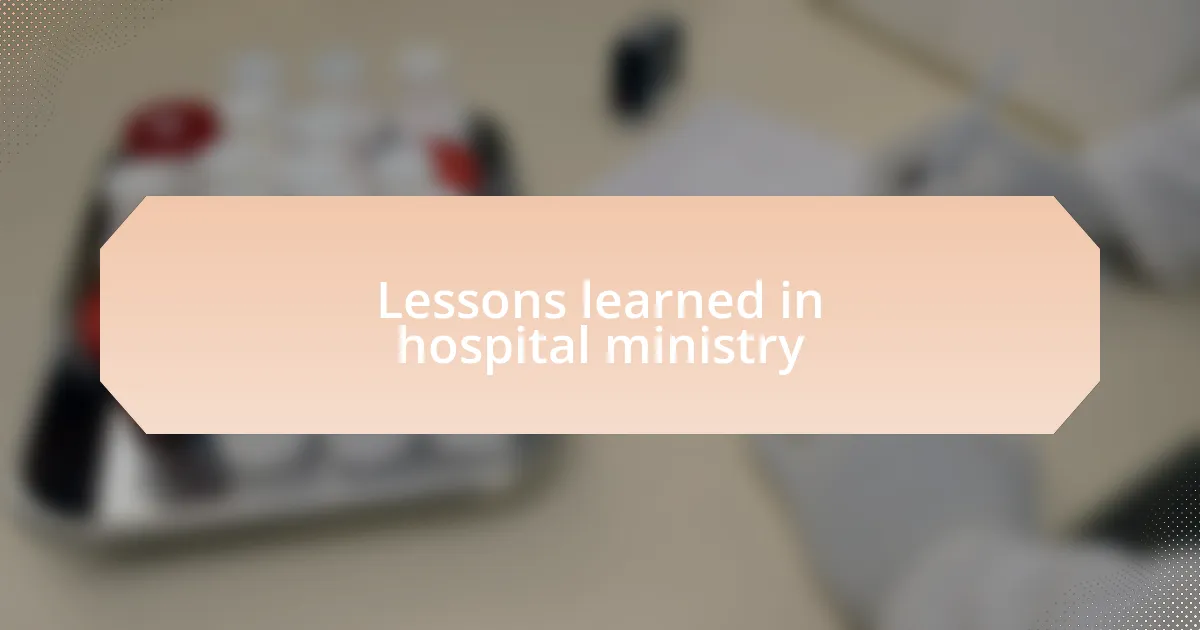
Lessons learned in hospital ministry
Being present in the hospital environment has taught me the profound importance of listening. There was a time when a patient shared her regrets about decisions made in her life. I found myself just sitting quietly, allowing her words to pour out. In that moment, I realized that sometimes, the greatest gift we can offer is simply our attentive presence—how often do we underestimate the power of truly hearing someone?
Another lesson I’ve learned is how vulnerability can connect us. During my time in the pediatric ward, I connected with a teen who was facing a long recovery. She had every reason to feel isolated, yet as we shared a cup of herbal tea, she opened up about her fears and aspirations. I felt a deep sense of kinship knowing that sharing vulnerability fosters trust and helps build relationships—even in the stark setting of a hospital.
Lastly, I’ve come to appreciate the role of gratitude in hospital ministry. One day, I helped a family write a thank-you letter to the medical team that saved their loved one. As we crafted each sentence, I witnessed the power of gratitude transforming their anxiety into hope. Isn’t it fascinating how expressing appreciation can create a ripple effect, not only uplifting those being thanked but also enriching the hearts of those offering the thanks?